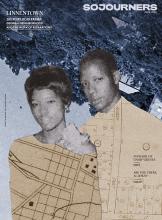This article comes by way of Empowerment Avenue, a nonprofit that works to normalize the inclusion of incarcerated writers and artists in mainstream venues by bridging the gap between them as a path to decarceration and public safety. — The Editors
IN A DIMLY lit room, Noah sits hunched over his half-finished masterpiece. The canvas comes alive under his skilled hand, revealing the weathered face of an old field worker — the grandfather of a dear friend. Every stroke tells a tale of resilience, etching lines of wisdom and hardship that speak to a life often overlooked. As the evening unfolds, Noah’s focused concentration becomes a beacon, drawing curious onlookers who gather around to witness the birth of art.
This is how I think of Bonifacio Alcantar-Maldonado, who I know by his prison handle, “Noah.”
Known outside by his childhood nickname “Junior,” Alcantar-Maldonado is incarcerated at the Washington Corrections Center in Shelton, Wash., where I am serving a life sentence. His life is now defined by two cruel political realities — heartless immigration policies and harsh criminal laws. His story illustrates the waste of human potential by a politics that promotes fear of those struggling in other countries and at home.
Read the Full Article

